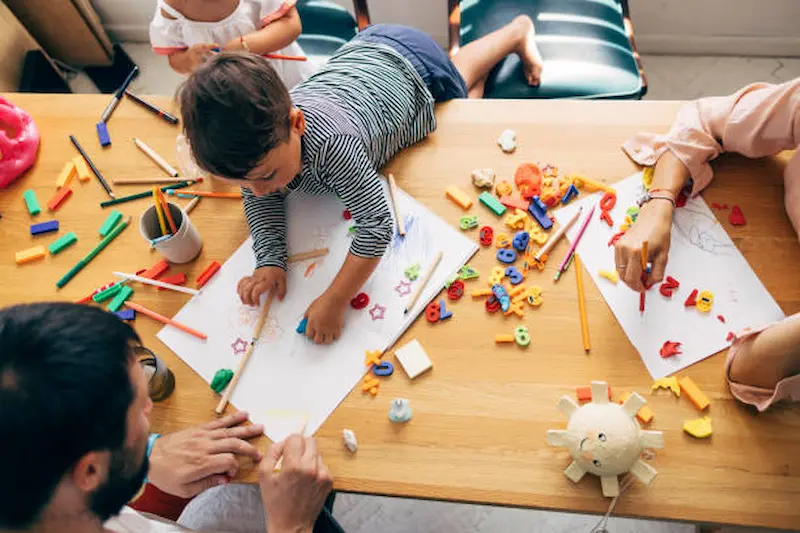Parenting is a profound responsibility that shapes a child’s future. It involves fostering emotional well-being, instilling values, and providing a secure foundation for growth. Understanding the science behind child happiness involves recognizing the impact of positive environments, emotional support, and developmental needs. This knowledge empowers parents to create conditions conducive to their child’s overall well-being. This guide offers practical insights into effective parenting, exploring key aspects such as emotional support, discipline, and education. It aims to empower parents with valuable strategies to navigate the complexities of raising happy and well-adjusted children.
In this blog, discover valuable parenting advice that emphasizes fostering a supportive environment, nurturing open communication, and cultivating a balance between discipline and empathy. Explore insights on building strong family bonds, navigating challenges, and promoting the holistic well-being of both parents and children for a fulfilling parenting journey.
Table of contents
- Setting the Foundation for Happiness
- Effective Communication
- Teaching Values and Morals
- Providing Quality Education and Learning Experiences
- Balancing Discipline and Freedom
- The Role of Play and Creativity
- Navigating the Challenges of Technology
- Encouraging Physical and Emotional Health
- Building Strong Family Bonds
- Understanding Age-Specific Needs
- Handling Special Situations
- Staying Informed and Adapting
- Conclusion
- Frequently Asked Questions ( FAQs )
Setting the Foundation for Happiness

A. Love and Emotional Support:
- Cultivate deep connections with loved ones.
- Prioritize open communication and empathy.
- Emotional support fosters resilience and happiness.
B. Creating a Safe Environment:
- Establish trust and stability in relationships.
- Provide a physical and emotional safe space.
- A secure environment promotes a sense of well-being.
C. Establishing Healthy Routines:
- Prioritize a balanced daily schedule.
- Incorporate activities that promote physical and mental health.
- Consistent routines contribute to overall life satisfaction.
D. Nurturing Healthy Self-esteem:
- Encourage self-reflection and self-acceptance.
- Acknowledge achievements and strengths.
- Positive self-esteem is key to sustained happiness.
Effective Communication
Effective Communication is the cornerstone of successful parenting. Establishing open and honest channels with your child builds trust and understanding.
Actively listen to their thoughts and feelings, validating their experiences. Use clear and positive language to convey expectations and provide constructive feedback. Encourage your child to express themselves, promoting a sense of autonomy. By fostering a communicative environment, parents facilitate healthy relationships, emotional intelligence, and a supportive foundation for their child’s overall well-being and development.
Teaching Values and Morals

Teaching values and morals is integral to shaping a child’s character and ethical compass, incorporating critical thinking skills for kids. Instill core values such as honesty, empathy, and responsibility through both words and actions. Lead by example, demonstrating the principles you wish to impart. Encourage critical thinking and discussions about moral dilemmas, fostering a strong moral foundation. By incorporating values into daily life, parents contribute to the development of socially responsible individuals who navigate the world with integrity and compassion, promoting a harmonious and ethical society.
Providing Quality Education and Learning Experiences
Providing Quality Education and Learning Experiences is paramount for a child’s development. Offer a diverse range of educational opportunities that cater to their interests and learning styles. Foster a love for learning by creating a stimulating environment that includes books, educational games, and interactive activities.
Stay involved in their educational journey, collaborating with teachers and encouraging a growth mindset. Recognize the importance of both formal and informal learning, nurturing curiosity and a lifelong passion for acquiring knowledge in various domains.
Balancing Discipline and Freedom
Balancing Discipline and Freedom is pivotal for fostering growth and responsibility in individuals.
A. Effective Discipline Techniques:
- Employ consistent and fair consequences for actions.
- Encourage communication to understand behavior triggers.
- Discipline should be constructive, aiming for learning rather than punishment.
B. Allowing Independence:
- Grant age-appropriate autonomy to foster decision-making skills.
- Independence builds confidence and a sense of responsibility.
- Balancing freedom with guidance ensures a healthy developmental path.
C. Teaching Responsibility:
- Impart the importance of accountability in actions.
- Assign tasks and chores to instill a sense of duty.
- Responsibility nurtures self-discipline and resilience.
D. Finding the Right Balance:
- Strive for a harmonious mix of discipline and freedom.
- Adapt approaches based on individual needs.
- A balanced environment cultivates individuals who can navigate challenges with both discipline and freedom.
The Role of Play and Creativity

The Role of Play and Creativity is pivotal in a child’s development.
A. The Benefits of Play:
- Play fosters cognitive, social, and emotional skills.
- It enhances problem-solving abilities and resilience.
B. Encouraging Creative Expression:
- Support artistic endeavors to stimulate imagination.
- Creative expression nurtures individuality and innovation.
C. Quality Time Activities:
- Engage in activities that promote bonding.
- Shared experiences strengthen parent-child relationships.
D. Importance of Unstructured Play:
- Unstructured play cultivates independence and decision-making.
- It allows children to explore their interests, fostering a love for learning through self-directed discovery.
Navigating the Challenges of Technology

Navigating the challenges of technology is essential in today’s digital age, including leadership skills for kids. Embrace technology wisely by fostering a healthy relationship with screens and devices. Encourage mindful usage, promoting a balance between virtual and real-world experiences. Teach critical thinking to navigate online information responsibly, addressing cyberbullying and privacy concerns. Promote open communication about technology’s impact, ensuring its positive integration into daily life while safeguarding mental and emotional well-being.
Stay informed and engaged, empowering individuals to harness the benefits of technology while navigating its challenges effectively, fostering responsible and informed digital leadership skills.
Encouraging Physical and Emotional Health
Encouraging Physical and Emotional Health is crucial for overall well-being. Prioritize regular physical activity to promote fitness and a healthy lifestyle. Nurture emotional health by fostering open communication, addressing feelings, and teaching effective coping mechanisms. Balanced nutrition plays a pivotal role, supporting physical growth and mental alertness. Create a supportive environment that emphasizes the importance of self-care, adequate sleep, and stress management. By integrating these elements, you empower individuals to maintain a harmonious balance between physical and emotional health, laying the foundation for a fulfilling life.
Building Strong Family Bonds

Building Strong Family Bonds is the cornerstone of a thriving family unit.
A. Family Traditions and Rituals:
- Instill a sense of belonging and continuity.
- Traditions create cherished memories, fostering family identity.
B. Creating Memories:
- Engage in shared activities and experiences.
- Positive memories contribute to a strong emotional foundation.
C. Sibling Relationships:
- Encourage communication and mutual respect.
- Sibling bonds teach cooperation, conflict resolution, and lifelong support.
D. Quality Time Together:
- Prioritize undivided attention.
- Meaningful interactions strengthen connections, promoting a sense of unity and love within the family.
Understanding Age-Specific Needs
Understanding Age-Specific Needs is essential for tailored care and child cognitive development. Recognize and cater to the unique requirements of each life stage, from early childhood to adolescence. Infants need nurturing care, toddlers thrive on exploration, and adolescents benefit from autonomy and guidance. Stay informed about cognitive, emotional, and social milestones, adjusting your approach accordingly. By acknowledging and addressing age-specific needs, you create an environment that supports optimal growth and development, fostering a well-rounded and confident individual at every stage of life.
Handling Special Situations

Handling Special Situations demands unique parenting approaches for diverse family structures.
A. Single Parenting:
- Juggling roles requires resilience and self-care.
- Building a strong support network is crucial.
B. Blended Families:
- Nurture open communication to navigate complexities.
- Foster a sense of unity while respecting individual backgrounds.
C. Parenting Children with Special Needs:
- Embrace patience and advocacy.
- Tailor parenting to meet individual requirements, promoting inclusivity.
D. Long-Distance Parenting:
- Prioritize consistent communication.
- Leverage technology to stay involved and maintain emotional connections, ensuring a meaningful parent-child relationship despite physical distances.
Staying Informed and Adapting
Staying Informed and Adapting is essential in the ever-evolving landscape of parenting. Continuously educate yourself on child development, parenting techniques, and societal changes that impact family life. Adapt your approach to meet the evolving needs of your child at different stages.
Open communication, flexibility, and a willingness to learn enable parents to stay attuned to their child’s changing world, fostering a supportive environment that promotes growth, resilience, and enduring family connections.
Conclusion
Good parenting is essential for a child’s holistic development and well-being. It involves providing love, emotional support, and a secure environment. When parents actively engage in their child’s life, fostering open communication and setting positive examples, it contributes to the child’s emotional resilience and self-esteem. Consistent discipline, coupled with encouragement and praise, helps instill a sense of responsibility. Moreover, a nurturing environment promotes intellectual growth, educational success, and positive social interactions. The benefits extend into adulthood, as well-adjusted individuals raised with care are more likely to form healthy relationships, pursue meaningful careers, and contribute positively to society.
Elevate your child’s learning journey with BrightChamps, the leading EdTech company offering a transformative blend of robotics, financial education, and coding courses.
To get your hands on more such articles, educational content, and free resources on coding for kids, robotics courses, game development, etc., check out the BrightCHAMPS Blog Page now!
Frequently Asked Questions ( FAQs )
A1. The key to raising a happy child lies in providing a loving and supportive environment where they feel valued and understood.
Q2. How can I help my child develop emotional intelligence?
A2. Foster your child’s emotional intelligence by encouraging open communication, validating their feelings, and teaching them empathy towards others.
Q3. What’s the best way to handle a temper tantrum?
A3. The best way to handle a temper tantrum is to stay calm, acknowledge their emotions, and provide a safe space for them to express themselves, helping them learn emotional regulation.
Q4. How do I balance work and parenting effectively?
A4. Effectively balance work and parenting by prioritizing tasks, setting boundaries, and creating dedicated quality time for your child.
Q5. How can I encourage my child’s independence without being overprotective?
A5. Encourage your child’s independence by offering age-appropriate responsibilities and guidance, allowing them to learn and grow with a sense of autonomy.


 We are an army of educators and passionate learners from BrightChamps family, committed to providing free learning resources to kids, parents & students.
We are an army of educators and passionate learners from BrightChamps family, committed to providing free learning resources to kids, parents & students.
















